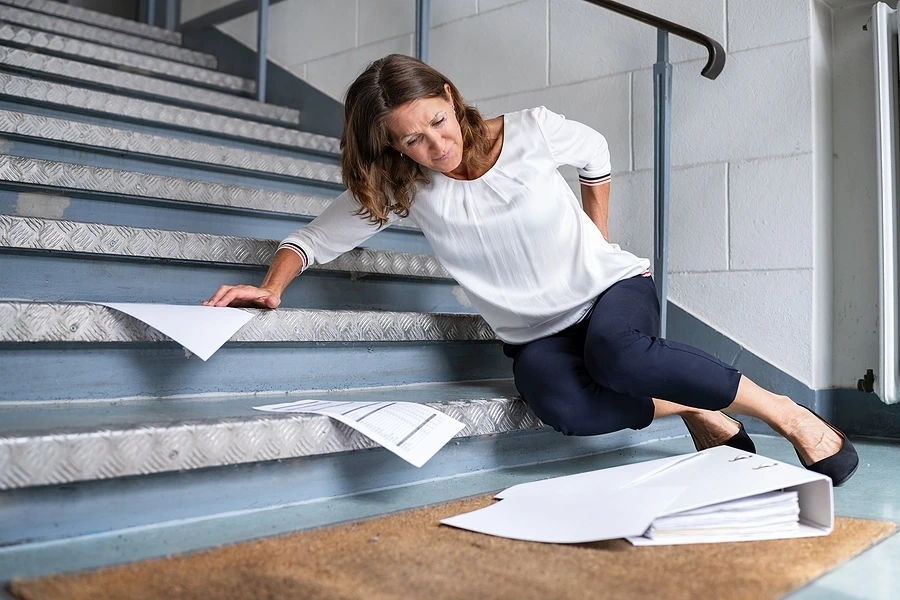Legal Steps to Take After a Slip and Fall at a Business

Slip and fall accidents at businesses can cause serious injuries and create unexpected financial burdens. In Alabama, property owners have a legal duty to maintain safe conditions for visitors. When this duty is breached and someone is injured, the victim may be entitled to compensation. Understanding the proper legal steps after a slip and fall is critical for protecting your rights and ensuring that your case is handled effectively.
Seek Medical Attention Immediately
The first and most important step after a slip and fall is to seek medical care. Even if injuries appear minor, conditions like concussions, fractures, or internal injuries may not be immediately obvious. Prompt medical attention not only safeguards your health but also creates official documentation of your injuries. Medical records serve as key evidence in a personal injury claim and can help establish the connection between the fall and the damages you are seeking.
Report the Incident to the Business
Notify the business where the accident occurred as soon as possible. Most businesses have procedures for documenting accidents involving customers or visitors. Request that the report include the date, time, location, and circumstances of the fall. It is important to be factual and avoid speculating about fault in your report. Having an official record can help demonstrate that the business was aware of the hazard and that you followed proper procedures in reporting the incident.
Document the Scene and Gather Evidence
Collecting evidence at the scene is critical for supporting your claim. Take photographs or videos of the area where the fall occurred, including any hazards such as wet floors, uneven surfaces, or debris. If possible, note the lighting, signage, or lack thereof, and any other conditions that may have contributed to the accident. Gather contact information for witnesses, including employees and other patrons who saw what happened. Detailed documentation provides a clear record and strengthens your case.
Preserve Clothing and Personal Items
Clothing and personal items worn during the accident can serve as evidence of the circumstances surrounding the fall. Preserve shoes, outerwear, or any items that were damaged or contributed to the incident. These items may be analyzed to better understand the fall and support claims about the hazard or the extent of your injuries.
Avoid Giving Recorded Statements to Insurance Companies Without Legal Guidance
After a slip and fall, insurance companies may contact you quickly to request a statement or documentation. While it is important to cooperate, avoid giving recorded statements or signing documents without consulting an attorney. Insurance adjusters are trained to minimize liability and may use statements against you. A personal injury attorney can guide you on how to communicate effectively while protecting your legal rights.
Keep Detailed Records of Your Injuries and Expenses
Maintain a comprehensive record of all injuries, treatments, and related expenses. Include medical bills, physical therapy costs, prescription records, and transportation expenses related to medical care. Document any time off work and lost wages. Keeping organized records ensures that all damages are accounted for and can support your claim for full compensation.
Consult With an Experienced Personal Injury Attorney
Hiring an attorney who specializes in slip and fall cases in Alabama is essential. An experienced lawyer understands the state’s premises liability laws and can assess the strength of your case. Attorneys handle negotiations with insurance companies, gather expert evidence if needed, and represent your interests in court if a settlement cannot be reached. Legal guidance increases the likelihood of receiving fair compensation while reducing stress during the recovery process.
Understand the Legal Standard for Premises Liability in Alabama
In Alabama, property owners are required to maintain reasonably safe conditions for lawful visitors. To hold a business accountable for a slip and fall, it must be shown that the owner knew or should have known about the dangerous condition and failed to take reasonable steps to correct it. Evidence such as maintenance records, inspection reports, and employee testimony can be critical in proving negligence.
Avoid Delaying Action
Timeliness is important in slip and fall cases. Alabama law imposes a statute of limitations for personal injury claims, typically two years from the date of the accident. Waiting too long to take action can jeopardize your ability to file a claim. Promptly seeking medical care, reporting the incident, and consulting an attorney ensures that all evidence is preserved and deadlines are met.
Consider Expert Evaluation if Necessary
Some slip and fall accidents require expert analysis to determine the cause of the hazard or to assess the severity of injuries. This may include engineers, safety experts, or medical specialists. Expert testimony can clarify factors such as flooring conditions, lighting, and whether the hazard was obvious or preventable. In complex cases, expert input can significantly strengthen your claim.
Maintain Communication With Your Attorney
Keep an open line of communication with your attorney throughout the process. Provide updates on medical treatments, changes in your condition, and any correspondence from insurance companies. Clear communication allows your attorney to respond quickly to developments and ensure that your case remains on track.
Conclusion
A slip and fall at a business can have serious physical, emotional, and financial consequences. Taking the right legal steps in Alabama is essential for protecting your rights and pursuing fair compensation. Seeking medical attention, documenting the scene, preserving evidence, reporting the incident, and consulting an experienced attorney are all critical actions. By acting promptly and methodically, victims can navigate the legal process effectively and focus on recovery while ensuring that their interests are represented.